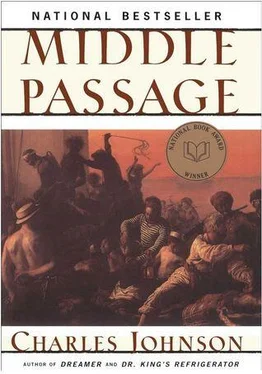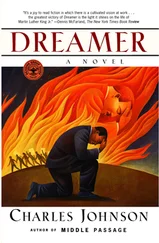I stopped, and stared quite helplessly at Isadora, who said, “I thought this was what you wanted?”
“Isadora, I. . don’t think so.”
She studied my face, saying nothing, and in this wordless exchange felt the difference in me. It coincided, I sensed by slow degrees, with one in herself, for in her disheveled blankets we realized this Georgia fatwood furnace we were stoking was not the release either of us needed. Rather, what she and I wanted most after so many adventures was the incandescence, very chaste, of an embrace that would outlast the Atlantic’s bone-chilling cold. Accordingly, she lowered her head to my shoulder, as a sister might. Her warm fingers, busy as moths a moment before, were quiet on my chest. Mine, on her hair as the events of the last half year overtook us. Isadora drifted toward rest, nestled snugly beside me, where she would remain all night while we, forgetful of ourselves, gently crossed the Flood, and countless seas of suffering.
Many sea stories and histories of ships from many cultures went into research for this novel. However, special citation must go to W. R. Thrower’s excellent Life at Sea in the Age of Sail, John A. Garraty’s The American Nation, and the voluminous writings of Eknath Easwaran. I would also like to thank Seattle writer Mark Gray for letting me use his description of southern Illinoisan speech; novelist Richard Wiley for answering my questions about Africa; martial artist Gray Cassidy for providing me with several articles on the black fighting art, capoeira; filmmaker Art Washington for keeping me politically honest; Russell Banks for inspiration; scholar Werner Sollors of Harvard for sending me narratives of the sea; Scott Sanders for his encouragement; Gene Clyde for his books on shipbuilding; Janie Smith for her patience in typing my generally chaotic manuscript pages; Callaloo for publishing the first chapter and F3 the second, when the book was called Rutherford’s Travels; and the Guggenheim Foundation for a grant to complete the novel.
A SCRIBNER READING GROUP GUIDE
THEMES & QUESTIONS
1. Narration
Middle Passage is the story of an adventurer who takes to the high seas. It is also the story of a writer. As the narrative’s protagonist Rutherford Calhoun explains, “Only the hours I spent hunched over the skipper’s logbook kept me steady. . Then, as our days aboard the Juno wore on, I came to it with a different, stranger compulsion — a need to transcribe and thereby transfigure all we had experienced, and somehow through all this I found a way to make my peace with the recent past by turning it into Word” (pp. 189–90).
• Consider the role of storytelling in the novel. How do the stories recorded by Rutherford Calhoun enable him to make sense of his experiences, and thus perhaps aid him in coping with the many moral and other challenges he faces?
• Consider the role of storytelling in your own life. What stories are important to you? And how do these stories help you to cope with and make sense of your experiences?
• The quotation cited above expresses a positive function of storytelling. Are there also examples in the novel of characters who have fallen victim to false stories, either their own or those of others?
• The term metafiction refers to fictional works that call attention to their own making, breaking the illusion that the world created by the writer is real. Instead of wanting us to forget that the story is a work of fiction that has been made up, authors of metafictional texts keep reminding us that the world they have created is artificial. In what ways is Middle Passage metafictional?
• Why do you think Johnson chose a metafictional approach to telling his story? Think about the names Johnson assigns to people, places, and things. There are characters named Rutherford Calhoun, Squibb, Cringle, and Falcon, a country called Bangalang, and a slave ship christened the Republic.
• What are the implications and ironies of some of the names Johnson uses in Middle Passage? The Republic was unstable physically and the crew was constantly rebuilding it. The ship was, according to Calhoun, “a process” (p. 36). Cringle says that the ship would not remain the same as it was when leaving New Orleans; the Middle Passage would change it.
• Is the ship the metaphor for the process of life itself?
• If so, what is Johnson saying about the human condition? The historical Middle Passage was a source of horrific emotional, physical, and spiritual suffering for millions of Africans. In addition, it served as their introduction to the dehumanizing institution of slavery. Johnson has been criticized for transforming that grim reality into a comic (at least in part) adventure story.
• Do you agree with these criticisms?
• Why or why not?
2. Freedom and Bondage
Issues related to freedom and bondage play an important role in Middle Passage. The institution of slavery is an obvious form of physical bondage. Johnson seems to suggest that minds can be enslaved as well as bodies.
• Consider the ways that characters in the novel are enslaved — to marriage, to money, to ignorance, to habit, to false traditions, to debt, etc. Is anyone in the novel free? If so, who?
• What characters are enslaved? To what are they enslaved? Are they aware of their enslavement? Can they become free? And if so, how?
• What does freedom mean for Rutherford Calhoun? For you?
3. Identity and Transformation
Liminality is a sociocultural state of being in which a person is betwixt and between, neither this nor that, belonging to two groups and to none. The condition of being liminal often gives one license to do things and go places typically denied others. Rutherford Calhoun says that the Middle Passage has rendered him a “cultural mongrel” (p. 187), and thus liminal.
• In what ways is Rutherford Calhoun both a part of and separate from American society?
• In what ways is he similar to and different from his African-American contemporaries?
• In what ways is he both a part of and separate from the ship’s social system?
• What freedoms and what limitations arise from Rutherford Calhoun’s liminality? Throughout Middle Passage, there is a sustained examination of issues related to ethnic/racial identity, whether “White” or “Black,” “pure bred” or mixed-race Creoles, “American” or “African,” etc.
• Is “race” biological? Cultural? Social? Is it a useful category? Why or why not?
• In what ways have attitudes toward race changed since the mid-nineteenth century? In what ways have attitudes remained the same?
4. Union and Transcendence of Opposites
Johnson’s work frequently draws upon Eastern philosophy, and in this respect, Middle Passage is no exception. An appreciation of duality is central to many Eastern approaches to understanding the role complementary opposites (e.g., male/female, free/enslaved) play in shaping our lives and the universe we inhabit. When reading, be attentive to these dualist couplings of seeming opposites.
• Consider the opposition of shore and sea in the novel and the qualities that Johnson attaches to each. Why does Calhoun, who seeks freedom on the sea, long for “solid ground” (p. 204) at the novel’s end?
• What other oppositional pairings can you find? Are any transcended? If so, how?
5. Quest
American literature is filled with men and boys who leave the restrictions of society behind to seek a new, free life on the untamed frontier. In many respects, men of the sea have much in common with the rugged frontiersmen who followed the dictate “Go West, Young Man” in seeking both their fortune and freedom.
Читать дальше












